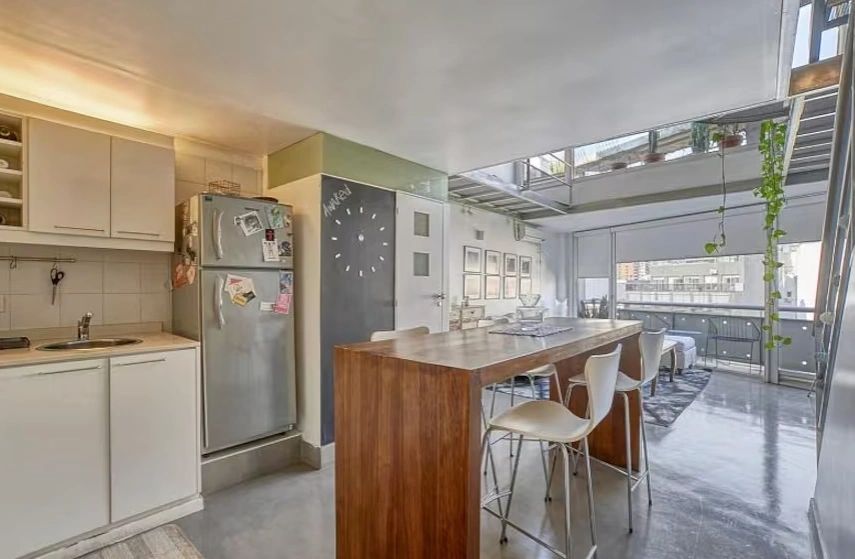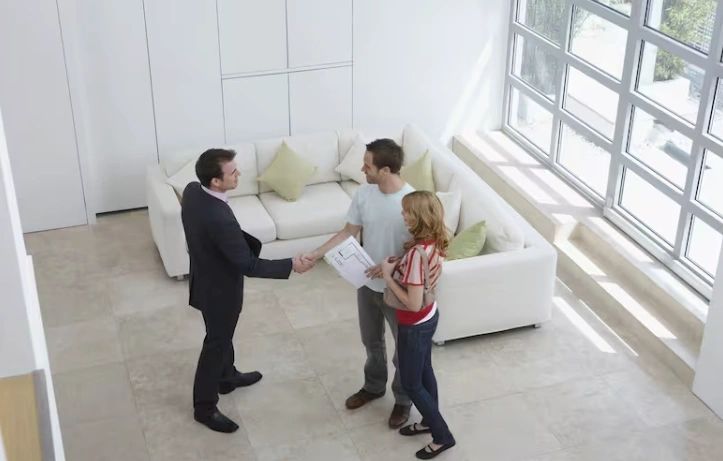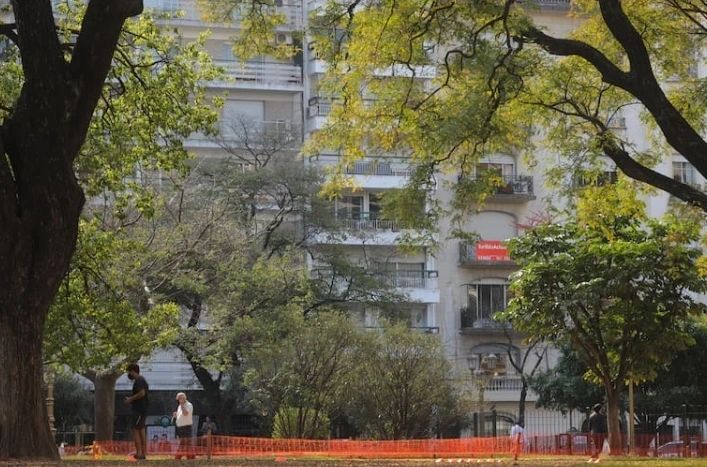BuySellBA
Administrator
Buy-to-rent. These are the mortgage loans that allow you to do so if you don't have all the money - La Nacion Propiedades

Source:

 www.lanacion.com.ar
www.lanacion.com.ar
June 13, 2025
Many people wonder if it is possible to rent out a property purchased with a bank loan in Argentina, so that the tenant's income can cover the loan payments.
By maria Josefina Lanzi

Experts answer whether it is possible to buy a property with a mortgage and rent it out.
Since mortgage lending became available in April of last year, the possibility of owning a home has gained prominence and become a recurring topic of conversation among Argentines. Furthermore, real estate has regained its appeal as an investment option, with profitability growing last year (reaching 5.37% in May , according to Zonaprop), leading many to look again at this sector as a way to stretch their savings. In this regard, some interested in investing in properties are asking themselves a question: is it possible to buy a property with a mortgage and immediately rent it out?
The experts consulted affirm that, as a general principle, property acquired with a mortgage can be rented, whether it is a property purchased as a first or second home. However, the experts point out that this can change if the parties expressly state otherwise in the mortgage deed.
“If the mortgage contract doesn't state anything, then it's perfectly fine to rent it out. But there are banks that prohibit renting out the mortgaged property in their credit lines. Ultimately, everything will depend on what the parties freely agree to (the conditions established by the banks for requesting a loan), as stated in Article 958 of the Civil and Commercial Code, that is, the principle of contractual freedom,” says Enrique Abatti, a lawyer specializing in the real estate market and president of the Chamber of Property Owners of the Argentine Republic. In this regard, Marta Liotto, former president of the Real Estate Association of Buenos Aires City, points out: “ From a legal standpoint, there's nothing to prevent it , whether it's a first, second, fourth, or tenth mortgage. However, many banks (if not all) add a clause to their mortgages to prevent renting out , and if the loan isn't repaid, the collateral can be foreclosed.” That is, if the debtor fails to pay the mortgage, the creditor can claim the property as collateral, since no third party is occupying it.

Many banks add a clause to prevent renting in mortgages.SaiArLawKa2 - Shutterstock
Mariano Esper, a lawyer specializing in real estate matters and a professor at the University of Buenos Aires (UBA) and the Universidad Austral (Universidad Austral), warns that this could be interpreted as not being possible with a lease. In this regard, he points to Article 2195 of the Civil and Commercial Code, stating that it establishes that the mortgagor "retains all the powers inherent to his right, but cannot perform any act that diminishes the value of the collateral." "That is, even when the deed does not say anything in this regard, the rule of Article 2195 always applies, and thus it could be argued that renting the mortgaged property may constitute an act prohibited by said article, since it may be considered to diminish the value of the collateral ," the lawyer concludes, although he warns that this is an interpretation of the law, which could also be interpreted in another way.
In any case, Esper insists that any mortgage deed, even the most basic, usually contains some condition related to the debtor's obligation to seek permission from the creditor (in these cases, the bank lending the money) in order to rent the property. "Mortgage deeds, especially bank deeds, usually have a very strong clause stipulating that the owner, who is the mortgagor, may not perform any act on the mortgaged property that could harm the mortgagee's rights." Esper exemplifies by providing a model clause that is often used: “While the mortgage obligation subsists, the debtor agrees not to encumber, lease, rent, assign, transfer, mortgage or enter into contracts constituting antichresis, servitude, use, loan for use, habitation, leasing or other rights that imply restrictions on the encumbered assets, nor allow a third party to exercise retention rights on the property, nor recognize any type of restriction on the property, nor carry out any other act or fact of material or legal disposition not listed in this paragraph that has as its object or as a consequence the reduction of the mortgage guarantee that is hereby implemented, without the express consent of the creditor.”
Ultimately, to know exactly what each Argentine bank currently offering mortgage loans stipulates in this regard, it is necessary to analyze each one.

Specialists explain that any mortgage deed, even the most basic, usually contains some clause linked to the debtor's obligations to request the creditor's permission to rent the property.sirtravelalot - Shutterstock

Specialists suggest analyzing interest rates, the financing covered by the bank and the savings available to face possible risks.Hernan Zenteno - La Nacion/Hernan Zenteno
But is it a good investment? Economic analyst Darío Rubinsztein answers: “ It depends. In the United States, it's the most common thing in the world to buy properties with mortgages and rent them out, paying them off with the tenant's income, but you have to analyze several points to see if the equation makes sense .”
First, consider whether the interest rate is fixed or variable. If the latter is the case (which is the case for virtually all mortgage loans offered in Argentina today), consider analyzing inflation . UVA loans are adjusted for inflation, which means that if inflation soars, the loan becomes significantly more expensive. It's also worth noting that the interest rate on loans for second homes is usually higher than that for first homes , since the Argentine banks surveyed only allow rental loans for second homes. To mention a few examples, Galicia offers an interest rate of 10% for first homes, but rises to 12% for second homes. Nación also offers a nominal annual rate for clients who do not receive income through the bank of 8.1% for single-family homes for permanent occupancy, but increases to 9.78% for those who apply for a second home.
Another indicator to consider is whether the loan finances 100% of the property or only a portion, requiring savings . If the latter is the case, the economist suggests keeping in mind that it would be good to have extra savings, since if the tenant leaves the property early, someone else will have to cover the loan payments. It's also worth adding that some banks, when it comes to loans for second-home purchases, finance less than the value of the property. This is the case with Banco Santander, which finances 75% of the property's value for permanent properties, but for non-permanent properties, it lends up to 50% of the property's value.
Another important fact worth clarifying is that those considering purchasing a property with a mortgage to rent out and using second-home loans will have to pay VAT on the purchase, meaning the property would become 21% more expensive . One of the banks consulted adds an analysis on this matter, warning that the rental income may not always cover the loan installment. "If they declare it as a non-permanent residence, they pay VAT on the interest. Thus, if they rent it out, the income will likely not cover the entire loan installment, but rather approximately 70% (this is if they take out the loan with a 25% down payment)," explains COMAFI.
Other experts point out that, given the current interest rates, loans are expensive and would not allow for such a high investment. " I don't see it as a good investment , because you're paying a 7% interest rate on a loan for something that will earn you a 4% or 5% gross income (that is, without deducting taxes or the maintenance costs that the new property will entail). It might be good for someone who buys an apartment thinking they'll use it in a couple of years and in the meantime pays for it with rent," says Federico González Rouco, an economist specializing in housing.
www.buysellba.com

Source:
Comprar para alquilar. Estos son los créditos hipotecarios que te permiten hacerlo si no tenés toda la plata
Son muchos los que se preguntan si es posible poner en alquiler una propiedad que se compró con préstamo bancario en la Argentina, y que de esta forma los ingresos del inquilino cubran las cuotas del crédito
June 13, 2025
Many people wonder if it is possible to rent out a property purchased with a bank loan in Argentina, so that the tenant's income can cover the loan payments.
By maria Josefina Lanzi

Experts answer whether it is possible to buy a property with a mortgage and rent it out.
Since mortgage lending became available in April of last year, the possibility of owning a home has gained prominence and become a recurring topic of conversation among Argentines. Furthermore, real estate has regained its appeal as an investment option, with profitability growing last year (reaching 5.37% in May , according to Zonaprop), leading many to look again at this sector as a way to stretch their savings. In this regard, some interested in investing in properties are asking themselves a question: is it possible to buy a property with a mortgage and immediately rent it out?
The experts consulted affirm that, as a general principle, property acquired with a mortgage can be rented, whether it is a property purchased as a first or second home. However, the experts point out that this can change if the parties expressly state otherwise in the mortgage deed.
“If the mortgage contract doesn't state anything, then it's perfectly fine to rent it out. But there are banks that prohibit renting out the mortgaged property in their credit lines. Ultimately, everything will depend on what the parties freely agree to (the conditions established by the banks for requesting a loan), as stated in Article 958 of the Civil and Commercial Code, that is, the principle of contractual freedom,” says Enrique Abatti, a lawyer specializing in the real estate market and president of the Chamber of Property Owners of the Argentine Republic. In this regard, Marta Liotto, former president of the Real Estate Association of Buenos Aires City, points out: “ From a legal standpoint, there's nothing to prevent it , whether it's a first, second, fourth, or tenth mortgage. However, many banks (if not all) add a clause to their mortgages to prevent renting out , and if the loan isn't repaid, the collateral can be foreclosed.” That is, if the debtor fails to pay the mortgage, the creditor can claim the property as collateral, since no third party is occupying it.

Many banks add a clause to prevent renting in mortgages.SaiArLawKa2 - Shutterstock
Mariano Esper, a lawyer specializing in real estate matters and a professor at the University of Buenos Aires (UBA) and the Universidad Austral (Universidad Austral), warns that this could be interpreted as not being possible with a lease. In this regard, he points to Article 2195 of the Civil and Commercial Code, stating that it establishes that the mortgagor "retains all the powers inherent to his right, but cannot perform any act that diminishes the value of the collateral." "That is, even when the deed does not say anything in this regard, the rule of Article 2195 always applies, and thus it could be argued that renting the mortgaged property may constitute an act prohibited by said article, since it may be considered to diminish the value of the collateral ," the lawyer concludes, although he warns that this is an interpretation of the law, which could also be interpreted in another way.
In any case, Esper insists that any mortgage deed, even the most basic, usually contains some condition related to the debtor's obligation to seek permission from the creditor (in these cases, the bank lending the money) in order to rent the property. "Mortgage deeds, especially bank deeds, usually have a very strong clause stipulating that the owner, who is the mortgagor, may not perform any act on the mortgaged property that could harm the mortgagee's rights." Esper exemplifies by providing a model clause that is often used: “While the mortgage obligation subsists, the debtor agrees not to encumber, lease, rent, assign, transfer, mortgage or enter into contracts constituting antichresis, servitude, use, loan for use, habitation, leasing or other rights that imply restrictions on the encumbered assets, nor allow a third party to exercise retention rights on the property, nor recognize any type of restriction on the property, nor carry out any other act or fact of material or legal disposition not listed in this paragraph that has as its object or as a consequence the reduction of the mortgage guarantee that is hereby implemented, without the express consent of the creditor.”
Ultimately, to know exactly what each Argentine bank currently offering mortgage loans stipulates in this regard, it is necessary to analyze each one.

Specialists explain that any mortgage deed, even the most basic, usually contains some clause linked to the debtor's obligations to request the creditor's permission to rent the property.sirtravelalot - Shutterstock
Which banks allow renting out a property purchased with a mortgage?
Since specialists recommend investigating each bank's mortgage credit line clauses, LA NACION consulted each bank and learned what 15 Argentine banking entities that offer this type of loan stipulate .Banks that allow it
- Mortgage Bank: If the loan is purchased as a permanent, single-family home, it cannot be rented out. If it is purchased as a second home, it can be used as a rental.
- Banco Ciudad: This is not possible for a primary residence, as the contract stipulates that it is a permanent, single-family home; it is possible for a secondary home.
- Banco Santander: They clarify that it is possible for a second home, but not for those acquiring a first home.
- Comafi: Whoever takes out the mortgage loan must declare whether the property is intended for permanent residence or not. If it is intended for permanent residence, it cannot be rented. If they declare it is for non-permanent residence, it can be rented.
The banks that prohibit it
- Banco Galicia: Whether it's a loan for a first home or a second, "there's a clause in the contract specifying that the property is for permanent, personal use," the bank notes.
- Banco Nación: "It's not possible. Our mortgage loans are for single-family homes and permanent occupancy," they explained.
- BBVA: Does not allow it. The BBVA UVA mortgage loan is intended exclusively for the purchase of a single-family home for permanent occupancy. "The property provided as collateral cannot be subject to current rental contracts or used for rental purposes for the entire term of the loan," the bank also stated.
- ICBC: No rentals, whether for a first or second home.
- Banco Patagonia: This is not possible; the mortgage clauses expressly state that this option is excluded.
- Bancor (Banco de Córdoba): This line is for single-family homes, so it doesn't allow for purchases to be immediately used for rental.
- Rosario Municipal Bank: The bank clarifies that homes purchased with a mortgage cannot be rented.
- Bancos Santa Fe, Entre Ríos, San Juan, and Santa Cruz (Petersen Group): do not allow rental loans, whether for a first or second home.
Is this purchasing model a good option for investment?
There are various scenarios that can lead someone to want to buy a property and rent it out. Some may invest in it because they still live with their parents or a relative, are working, but don't yet need to become independent, so they buy a home they will move to in the future. This way, they rent the property and pay off the mortgage payments with the income provided by the tenant. Others may be interested in buying a property this way because they already own a property but are looking to move to a larger property. This way, while living in a smaller house, they can pay off their new property (the successive mortgage payments) without having to add other expenses. Another possible scenario for those who choose this option would be those who choose real estate as an investment: they are looking for a home that will generate income in a few years, although for several years the profit from the rent will simply have to be used to pay off the loan.
Specialists suggest analyzing interest rates, the financing covered by the bank and the savings available to face possible risks.Hernan Zenteno - La Nacion/Hernan Zenteno
But is it a good investment? Economic analyst Darío Rubinsztein answers: “ It depends. In the United States, it's the most common thing in the world to buy properties with mortgages and rent them out, paying them off with the tenant's income, but you have to analyze several points to see if the equation makes sense .”
First, consider whether the interest rate is fixed or variable. If the latter is the case (which is the case for virtually all mortgage loans offered in Argentina today), consider analyzing inflation . UVA loans are adjusted for inflation, which means that if inflation soars, the loan becomes significantly more expensive. It's also worth noting that the interest rate on loans for second homes is usually higher than that for first homes , since the Argentine banks surveyed only allow rental loans for second homes. To mention a few examples, Galicia offers an interest rate of 10% for first homes, but rises to 12% for second homes. Nación also offers a nominal annual rate for clients who do not receive income through the bank of 8.1% for single-family homes for permanent occupancy, but increases to 9.78% for those who apply for a second home.
Another indicator to consider is whether the loan finances 100% of the property or only a portion, requiring savings . If the latter is the case, the economist suggests keeping in mind that it would be good to have extra savings, since if the tenant leaves the property early, someone else will have to cover the loan payments. It's also worth adding that some banks, when it comes to loans for second-home purchases, finance less than the value of the property. This is the case with Banco Santander, which finances 75% of the property's value for permanent properties, but for non-permanent properties, it lends up to 50% of the property's value.
Another important fact worth clarifying is that those considering purchasing a property with a mortgage to rent out and using second-home loans will have to pay VAT on the purchase, meaning the property would become 21% more expensive . One of the banks consulted adds an analysis on this matter, warning that the rental income may not always cover the loan installment. "If they declare it as a non-permanent residence, they pay VAT on the interest. Thus, if they rent it out, the income will likely not cover the entire loan installment, but rather approximately 70% (this is if they take out the loan with a 25% down payment)," explains COMAFI.
Other experts point out that, given the current interest rates, loans are expensive and would not allow for such a high investment. " I don't see it as a good investment , because you're paying a 7% interest rate on a loan for something that will earn you a 4% or 5% gross income (that is, without deducting taxes or the maintenance costs that the new property will entail). It might be good for someone who buys an apartment thinking they'll use it in a couple of years and in the meantime pays for it with rent," says Federico González Rouco, an economist specializing in housing.
www.buysellba.com

